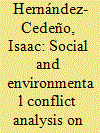|
|
|
Sort Order |
|
|
|
Items / Page
|
|
|
|
|
|
|
| Srl | Item |
| 1 |
ID:
180177


|
|
|
|
|
| Summary/Abstract |
This paper analyzes the social and environmental aspects of energy and large-scale projects through the use of Bayesian Networks. To do this, a database was created that includes conflict causes related to 267 projects in Mexico with 12 well-defined and orthogonal social and environmental conflict causes. These are lack of information and participation, fear of change to local communities, health and environmental damage, reduction of primary sector activities, proximity to cultural landmarks, employee dissatisfaction, political interests, violence to the community, water use, non-compliance of agreements, land use disputes, and others not defined. The database was the input for two Bayesian Networks, network “A” estimates the likelihood of approval or risk of suspension of a project because of the conflict causes, with an overall accuracy of 80.3%. The network “B” estimates the costs of conflictive situations and how likely they can be resolved by adding benefits. A sensitivity analysis found that five conflict causes can reduce the probability of a project's success by 10–39%. Finally, policy implications were identified, resulting in four recommendations for implementation in national regulations. The tools developed here enable measurement of the benefits of energy projects, provide policymakers tools to improve public decisions, and help avoid conflicts.
|
|
|
|
|
|
|
|
|
|
|
|
|
|
|
|
| 2 |
ID:
145029


|
|
|
|
|
| Summary/Abstract |
The links between environmental degradation, renewable resource scarcity, and conflict are still poorly understood. One reason for this is the positivist–rationalist bias which is characteristic of the mainstream literature on socio-environment conflicts but has largely remained unaddressed so far. Many studies are therefore unable to utilize insights from environmental sociology, constructivist conflict research, and political ecology. Drawing on this literature and discourse theory, the article develops a constructivist understanding of socio-environmental conflicts. The proposed framework highlights the relevance of discursively constructed identities, situation assessments, and interests for understanding the dynamics of such conflicts. The plausibility of the framework across different contexts is demonstrated by a discussion of the Israeli–Palestinian water conflict and forest conflicts in northern Thailand.
|
|
|
|
|
|
|
|
|
|
|
|
|
|
|
|
|
|
|
|
|